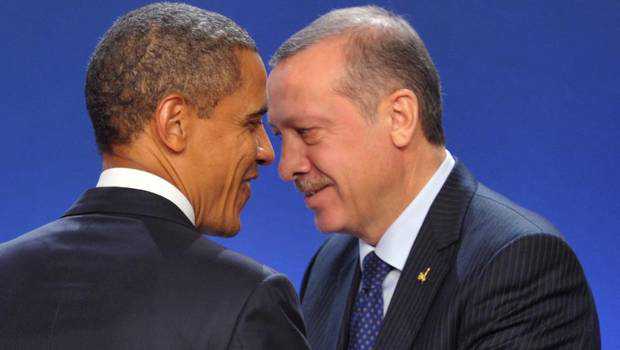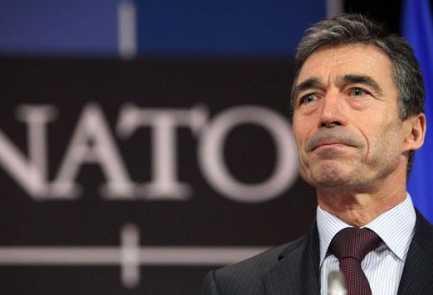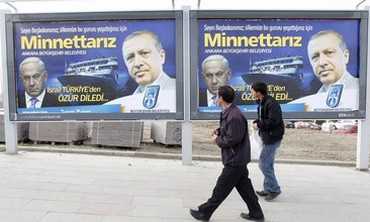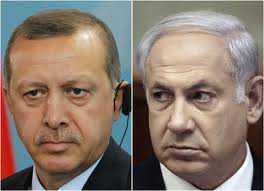Post-apology, are Israel and Turkey allies again, or uneasy frenemies?
ADNAN KHAN
The Globe and Mail
 If you believe the hype, Turkey and Israel are friends again. It’s been a long time coming. Four years ago, at the World Economic Forum in Davos, Turkish Prime Minster Recep Tayyip Erdogan walked off the stage during a debate with Israeli President Shimon Peres, accusing the moderator of not giving him enough time to respond to Mr. Peres’ comments on Israel’s military campaign in Gaza.
If you believe the hype, Turkey and Israel are friends again. It’s been a long time coming. Four years ago, at the World Economic Forum in Davos, Turkish Prime Minster Recep Tayyip Erdogan walked off the stage during a debate with Israeli President Shimon Peres, accusing the moderator of not giving him enough time to respond to Mr. Peres’ comments on Israel’s military campaign in Gaza.
The incident came to be known in Turkey as the 12-Minute Affair, referring to the time Mr. Erdogan was given to speak compared to the 25 minutes allotted to Mr. Peres. Turks began using the phrase proudly, if somewhat lightheartedly, at dinner parties and bars, raising their hands in the air during heated discussions with friends, shouting: “Twelve minutes! Twelve Minutes!”
A little more than a year later, in May 2010, Turkish-Israeli relations took a more ominous turn after a deadly raid by Israeli commandos on a Turkish cargo ship hired by the Turkish Humanitarian Relief Foundation (IHH), carrying supplies to civilians in Gaza, in defiance of Israel’s blockade. Eight Turks and an American citizen were killed in the pre-dawn chaos, prompting Turkey to expel Israel’s ambassador. Relations dipped to dangerous levels after Israel refused to apologize for the incident and pay compensation to the families of those killed, reaching their nadir when Turkey changed its designation of Israeli warplanes from ‘friendlies’ to ‘hostile.’ The apology finally came in late March this year following a visit to Israel by U.S. President Barack Obama. In Turkey, it was seen as another victory. Mr. Erdogan had triumphed again over the Goliath of the Middle East, raising his street cred among both Turks and Arabs.
In terms of U.S. strategic interests, the apology was critical. As Islamists cash in on the political windfall following the collapse of authoritarian governments throughout the Middle East, it’s Turkey that offers the kind of moderation and leadership the American administration needs.
But it’s a risky gamble. Turkey is nowhere near the human rights norms expected of it if it intends to reach international standards. A recent report by the Paris-based Reporters Without Borders dubbed Turkey “the world’s biggest prison for journalists.” The ruling Justice and Development Party (AKP) has been accused of using intimidation to silence critics and push forward an agenda many feel undermines Turkey’s secular system.
For Israel, these are worrying developments. Its apology falls into the rubric of necessity more than any genuine sense of remorse. In fact, Israeli and Turkish interests have never been as far apart as they are today, the victims of geopolitical realities neither could have anticipated.
But it is Turkey that has played the game expertly. The AKP occupies a novel category in conservative politics. It is perhaps the world’s only Muslim political party with a proven track record of successfully operating in a globalized democratic environment. It has shown a remarkable ability to read the key issues of its time, both domestically and geopolitically. In many ways, despite its increasing authoritarianism, it operates as a mature political party, catering to its key domestic constituencies – namely religious conservatives and the business community – while managing to preserve its international image as the pivot point between East and West.
Take Syria: In a recent interview with Turkish journalists, Foreign Minister Ahmet Davutoglu admitted his government has “concerns” over extremist groups gaining ground in the Syrian revolution but insisted that worrying about those groups now undermines the more urgent need – namely, to bring an end to the conflict.
The Israelis view events in Syria through a very different lens. Islamic extremism tops the agenda and as jihadists gain ground in Syria, Israel faces the prospect of another hardline Islamist government on its doorstep.
The Turkish approach is more subtle. On the one hand, it condemns groups like the Jabhat al-Nusra, the al-Qaeda-linked militants considered the most dangerous rebel group operating in Syria. On the other, it quietly supports groups like the Ahrar al-Sham, a Salafi-inspired Islamist faction that has made deep in-roads into Syrian society through its vast network of humanitarian relief operations.
The IHH, considered an arm of the AKP, has developed a strong working relationship with the Ahrar al-Sham. Most of the aid it delivers to Syria is channeled through them.
It’s hard to believe the AKP leadership is not aware of how the IHH operates. But the sensitivity of the issue, both inside Turkey where allegations of an Islamist conspiracy abound, and internationally where helping Islamist factions in Syria is tantamount to helping terrorists, poses serious problems for Ankara.
But the AKP has read the writing on the wall. It seems inevitable that Islamists will dominate Middle Eastern politics for the foreseeable future. As authoritarian regimes collapse, it’s these groups, with their networks of social organizations, that have offered their citizens a social agenda and capitalized on elections. Egypt’s Muslim Brotherhood swept to power on the back of a reputation for humanitarianism, developed over years of working among Egypt’s poor and disenfranchised. The secularists, who launched the Egyptian revolution, could not compete on the political stage. Young, and largely online, they were ill-equipped to address the ground realities facing everyday Egyptians.
Through its leveraging of these Islamist parties, Turkey has developed into a dominant force in the Middle East. The gambit in Syria follows this same logic: the Ahrar al-Sham is developing into the most influential group in Syria. Barring a wider civil war after the Assad regime collapses, it is posed to dominate the future of Syrian politics. And Turkey is its friend.
Obviously, the Israelis would not approve. Their nightmare scenario is a future Syria dominated by Islamists who reject Israel’s right to exist, or worse still a sectarian civil war that turns Syria into an Arab Afghanistan where al-Qaeda flourishes, right on Israel’s doorstep. It is a near-sighted vision, however, that fails to take into account the broader realities of the Arab Spring, and runs counter to the interests of Turkey.
But for the sake of appearance Turkey and Israel must appear to be friends again, as paper thin as that friendship actually is. It is a game, and Turkey is winning.
Adnan Khan is a writer and photographer who lives in Istanbul and Islamabad.




